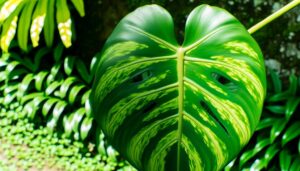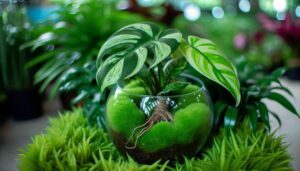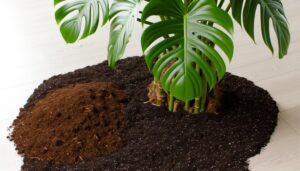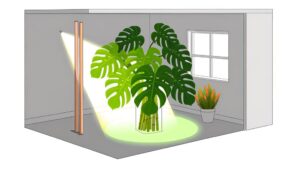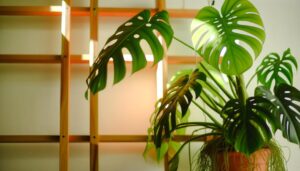Monstera Borsigiana Soil Preferences
Your Monstera Borsigiana prefers soil with a pH of 5.5 to 7.0. Ensure the mix includes peat moss, perlite, and pine bark for optimal moisture retention, aeration, and slight acidity.
Include coarse sand to enhance drainage and prevent root rot. Organic matter is essential for nutrients and microbial activity.
Regularly check soil moisture and avoid waterlogging by using a moisture meter. Amend the soil with slow-release fertilizer to address any nutrient deficiencies.
Top-dress with fresh, well-draining soil mix every six months. Stay with us for more tips on how to keep your Monstera thriving.
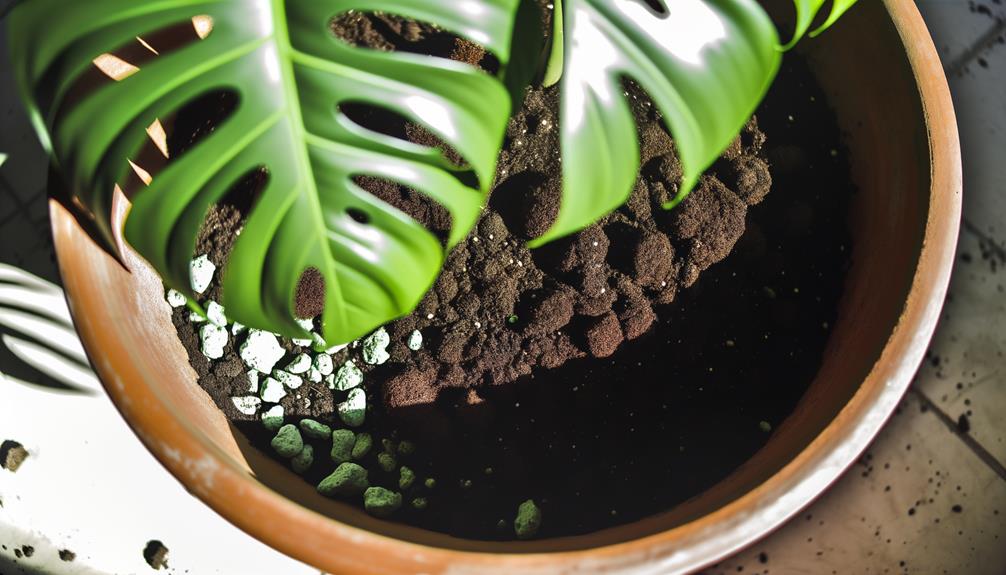
Key Takeaways
- Monstera Borsigiana prefers soil with a pH range of 5.5 to 7.0.
- Soil should include organic matter for nutrients and microbial activity.
- Ensure proper aeration with perlite and pine bark to prevent root rot.
- Use a mix of peat moss, perlite, pine bark, and coarse sand for optimal growth.
- Maintain well-draining soil to avoid waterlogged roots and promote healthy development.
Ideal Soil Ph Levels
For best development, Monstera Borsigiana thrives in soil with a pH level ranging from 5.5 to 7.0, which promotes nutrient availability and healthy root development. You'll want to regularly test the soil pH to check it stays within this ideal range.
If the soil's too acidic (below 5.5), key nutrients like phosphorus and magnesium become less available, potentially stunting development. Conversely, if the soil's too alkaline (above 7.0), iron and manganese deficiencies may occur, leading to chlorosis.
Adjusting soil pH can be achieved by incorporating specific amendments. For instance, sulfur or peat moss can lower pH, while lime can raise it. Monitoring and maintaining the correct pH level helps your Monstera Borsigiana flourish.
Essential Soil Components
When choosing soil for your Monstera Borsigiana, it's important to make certain it contains a balanced mix of organic matter, aeration materials, and proper drainage components to support robust growth. Organic matter provides essential nutrients and fosters microbial activity.
Aeration materials guarantee roots receive adequate oxygen, preventing root rot. Proper drainage components are critical to avoid waterlogging, which can suffocate roots.
Key components to contemplate include:
- Peat moss: Improves moisture retention and nutrient availability.
- Perlite: Enhances aeration and prevents soil compaction.
- Pine bark: Provides structure and promotes beneficial microbial activity.
- Coarse sand: Ensures effective drainage while maintaining soil stability.
Best Soil Mixes
To create a top-notch soil blend for your Monstera Borsigiana, you'll want to combine specific ratios of peat moss, perlite, pine bark, and coarse sand to guarantee balanced moisture retention, aeration, and drainage.
Start with 40% peat moss for moisture retention and organic matter.
Add 30% perlite to enhance aeration and prevent compaction.
Incorporate 20% pine bark for additional aeration and slight acidity, which Monstera thrives on.
Finally, mix in 10% coarse sand to improve drainage and reduce the risk of root rot.
This balanced mix ensures your Monstera Borsigiana receives the necessary nutrients while maintaining prime air and water flow, creating an ideal environment for healthy growth and vibrant foliage.
Drainage Requirements
Promoting the thriving of your Monstera Borsigiana starts with understanding that proper drainage is crucial to preventing waterlogged roots and promoting robust growth. Without adequate drainage, excess water accumulates, leading to root rot and stunted development. You'll want to guarantee that your potting mix includes components that aid drainage.
- Perlite: Improves aeration and reduces soil compaction.
- Bark chips: Provide structure and enhance water flow.
- Pumice: Lightweight, retains some moisture while facilitating drainage.
- Coarse sand: Assists in preventing soil from becoming too dense.
Incorporate these materials into your soil mix to create a well-draining environment.
Also, make sure your pot has ample drainage holes to allow excess water to escape, securing your Monstera Borsigiana stays healthy and vibrant.
Soil Maintenance Tips
Regularly monitoring the soil's moisture level and adjusting your watering schedule accordingly is essential for maintaining the best health of your Monstera Borsigiana.
Use a moisture meter to optimize the soil stays slightly damp but not waterlogged. Periodically check for compacted soil, as it can impede root aeration. If the soil feels dense, aerate it gently with a fork.
Additionally, inspect for signs of nutrient deficiency, such as yellowing leaves, and amend the soil with a balanced, slow-release fertilizer. Remove any decaying organic matter to prevent fungal growth.
Top-dress with fresh, well-draining soil mix every six months to maintain the most suitable soil structure. These steps will help optimize your Monstera thrives in its environment.
Conclusion
To maximize the growth of your Monstera borsigiana, focus on maintaining a slightly acidic to neutral soil pH of 5.5 to 7.0. Combining components like peat moss, perlite, and pine bark creates the ideal mix.
Remember, well-draining soil is crucial to prevent root rot. Interestingly, studies show that plants in prime soil conditions can grow up to 30% faster.
Regularly check and adjust your soil to keep your Monstera healthy and thriving.

